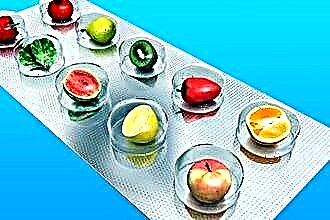In the conditions of modern life, each of us is exposed to stress, psychoemotional and physical stress, which, combined with bad habits, insufficiently balanced diet or irregular work schedule, provokes the development of cardiovascular diseases. With timely prevention, the risk of dangerous pathology is reduced. Vitamins for the heart - complexes in tablets or injections help to cope with such a problem. The attending physician, therapist or cardiologist will help you choose the drug and calculate the course of administration.
List of vitamins to strengthen the cardiovascular system
 Vitamins belong to a group of organic compounds with a different chemical nature, united according to the principle of necessity and usefulness for humans as an integral part of food. In nature, most of them exist in the form of precursors, which are released from coenzymes during metabolism and exchange.
Vitamins belong to a group of organic compounds with a different chemical nature, united according to the principle of necessity and usefulness for humans as an integral part of food. In nature, most of them exist in the form of precursors, which are released from coenzymes during metabolism and exchange.
For the normal functioning of all systems, a regular intake of these substances with food or from the environment is necessary, since many of them are not synthesized in the body. With a shortage, vitamin deficiency develops, and therefore, various complexes are used as prevention or treatment of cardiovascular diseases. They allow you to strengthen the heart muscle and blood vessels, normalize lipid metabolism and reduce the risk of complications.
According to modern classifications, the following useful substances are distinguished:
| Title and Description | The mechanism of action on the heart and blood vessels | Name of vitamins for the heart |
|---|---|---|
| Extensive group B, which includes more than 15 types of useful organic compounds. The name of which consists of a number and a letter. So vitamin B1 is called Thiamin, type 2 Riboflavin, 3 - Niacin, 5 - Panthenonic acid, - Pyridoxine, 7 - Biotin, 9 - folic acid, 12 - Cyanocobalamin, There are also types 8, 13 and 17 of group B substances, which are less commonly used in medicine. | These vitamins are indispensable for humans, participate in all metabolic reactions, including the process of hematopoiesis. Provide normal functioning of the heart muscle (myocardium), strengthen and increase vascular tone. They also affect the nervous system, increasing resistance to stress, thereby reducing the risk of cardiac complications. The complex normalizes fat metabolism and improves the excretion of cholesterol, which is useful at the first signs of atherosclerosis. With a pronounced shortage, hemoglobin decreases and anemia develops, the frequency and rhythm of the heartbeat may be disturbed (which leads to arrhythmias), and nervous irritability may increase. | Angiovit, Cardiovital, Napravit, Vitrum Cardio, Mulvit preparations for men and women in tablets and capsules, Milgamma or Kombilipen in ampoules for injections. |
| Ascorbic acid, (vitamin C) Rutin (R). | This substance is necessary for the normal course of all reactions in the body: enhancing the protective properties of immunity, improving the absorption of iron, the process of cell division, strengthening the vascular walls of arteries, veins and capillaries, and prevents the formation of atherosclerotic plaques. With a shortage, bleeding increases. | Vit. C in sugar dragees or solution in ampoules for injection. Blagomax zinc, selenium, rutin with vitamin C or the monopreparation Rutin (Ascorutin). |
| Tocopherol (E). | It is a powerful antioxidant necessary to maintain blood properties, normalize lipid (fat) metabolism. Reduces the risk of blood clots and vascular blockages. | Natural tocopherol in a bottle or capsules, a complex with vitamin A - Aevit. |
| Retinol (A). | Also prevents atherosclerotic lesions of arteries and veins, improves metabolism. | Vials with oily retinol solution for oral administration, combination with E. |
| Coenzymes (vitamin-like substances). | Coenzyme Q10 (Ubiquinone), L - carnitine (B11), Lipoic, Pangamic (B15) and Orotic acid (B13) and Choline (B4), Lecithin. They are similar in their properties to vitamins, they also play an important role in metabolism, as they are involved in all biochemical reactions. They improve the protective properties of the body, increase the supply of energy and tone, which has a positive effect on the heart and blood vessels, prevents the formation of blood clots and atherosclerotic plaques. | Doppelgerts Active Coenzyme Q10 in capsules, analogue of Capilar Cardio, CoQ10 or Solgar complex. Carnitine Nature Bounty, L form in capsules or tablets, in syrup, combination with Lipoic acid (KWC or Evelar). |
| Polyunsaturated fatty acids, Omega 3-6-9. | Normalize the metabolism of fats and cholesterol, improving metabolism, accelerating the process of weight loss. They have an anti-inflammatory effect, increase resistance to physical and psycho-emotional stress, which reduces the risk of cardiovascular complications. | Doppelgerz Active or Vitrum cardio with Omega 3, or in combination with three types of healthy fats. Omakor, Solgar Fish Oil Concentrate, Promegard or Oceanol. |
| Trace elements Potassium, Magnesium, Phosphorus, Selenium, Calcium. | Maintain energy balance and maintain electrolyte balance in the body. They normalize neuromuscular conduction and contractility of the heart. The treatment allows to prevent the development of rhythm disturbances, chronic fatigue syndrome, hypertension and heart attack. The correct ratio of electrolytes helps to eliminate arrhythmias and restore sinus heart rhythm. | Magne B6 complex in tablets or oral solution, Magnelis, Magnistad, Doppelgerts Active Magnesium with Potassium. Complivit Selenium, combination with C. Blagomax Selenium and Zinc with vitamins A, E, C, B6 in capsules. |
How often do you need to take and how long is the course?
Many people have a question: how to properly drink vitamins for the heart in tablets, when to start preventive therapy and what you need to know before buying the drug? Doctors strongly recommend thinking about your health in advance. After all, it is known that in the conditions of modern life, each person is subject to many factors that negatively affect the cardiovascular system.
At risk are individuals with a history of chronic vascular disease or cardiovascular disease, individuals over 30 years old, working in hard conditions, athletes undergoing intense training, or women during pregnancy. Given the wide range of medicines on the pharmaceutical market, choosing a product on your own is not always easy. In this case, you should contact your doctor, general practitioner or cardiologist.
Admission rules:
- First of all, you need to make sure of the presence of vitamin deficiency, and establish what kind of substance or element is missing. To do this, it is necessary to donate blood from a vein for clinical and biochemical analysis, and then receive medical advice on the choice of the drug.
- You should not purchase medicines on your own and take more than one vitamin complex at a time, since many organic compounds are not compatible with each other. For example: Ascorbic acid does not combine with copper, Tocopherol loses its properties in the presence of Ferum (iron), a set with B1 and 2 destroys folic acid, too much intake of Ascorbic acid reduces the absorption of B12.
 Taking into account the above incompatibilities and interactions, complexes with fewer useful components will be better absorbed. Also, before starting the course, you should study the content of the instructions, the rules of application.
Taking into account the above incompatibilities and interactions, complexes with fewer useful components will be better absorbed. Also, before starting the course, you should study the content of the instructions, the rules of application.- When taking other medications, before starting a vitamin course, you should discuss the compatibility of medications with your doctor.
- You need to drink tablets or capsules only with water, as other drinks will slow down the absorption rate.
- Do not exceed the prescribed dose, as this can cause allergies, urticaria (rash), side effects from the digestive system. With extreme caution, you should take drugs with trace elements (Potassium, Magnesium, Calcium), in case of an overdose, pathological arrhythmia (with altered heart rate and frequency) may develop. Rapid tachycardia or delayed bradycardia.
- Vitamin preparations for strengthening the heart in injectable form are shown strictly according to the doctor's prescription. An experienced healthcare professional, nurse or doctor should give intramuscular injections of Milgamma (Pyridoxine), B1, B6 and B12 complex (Neuroubin drug), or intravenous Ascorbic acid. With self-administration, there is a high risk of hematoma formation, an abscess with inflammation of the buttocks.
- If you experience skin irritation, red spots, shortness of breath, stomach pain, indigestion, heart pain, or rapid / slow heartbeat, stop taking the drug and see a doctor.
- The duration of the course is set by the attending doctor. For many complex preparations, the period is 2 - 4 weeks when taken daily. Injections are more often prescribed for a period of 7 to 10 days.
- The effectiveness of the therapy is assessed according to the blood and urine tests, the general condition of the patient, the electrocardiogram of the heart, and the lipid profile.
What is the effectiveness of the drugs?
According to medical research, each person needs more than 13 vitamins and 10 minerals every day. The right amount of nutrients is not always supplied with food, which is why their deficiency develops. The benefits of taking depends on the real cause of vitamin deficiency, the degree of lack of organic compounds, lifestyle, environment and many other factors.
Vitamins for strengthening the cardiovascular system are effective if you follow all the rules of intake and choose a quality product. There are such criteria:
 Monopreparations are absorbed better, therefore, when choosing a complex, the one in which the microencapsulation technology is observed (placing incompatible components in separate granules inside) will be more effective. Or a combination of multivitamin with tablets / capsules divided into different doses. Most often they have a different color, which makes it easier to receive.
Monopreparations are absorbed better, therefore, when choosing a complex, the one in which the microencapsulation technology is observed (placing incompatible components in separate granules inside) will be more effective. Or a combination of multivitamin with tablets / capsules divided into different doses. Most often they have a different color, which makes it easier to receive.- Multicomponent formulations are effective in preventing coronary heart disease (myocardial damage in conditions of insufficient oxygen saturation), atherosclerosis (since it normalizes cholesterol synthesis and reduces triglycerides).
- The combination of the amino acids L-arginine, L-carnitine with magnesium is effective in progressive cardiac pathology due to the effect on the nutrition of the heart muscle. As a result, the supply of nutrients to the myocardium improves, cerebral and peripheral circulation is stabilized. A decrease in the number of angina attacks in severe patients is possible.
- The main reasons for a decrease in tone, energy supply and depletion of the cardiovascular system are a lack of minerals and electrolytes. In this case, a good result is shown by means based on Potassium and Magnesium (Panangin or Asparkam), which have an antiarrhythmic effect, and their counterparts with Zinc, Copper and Selenium in the composition.
- Healthy fatty acids, omegas and coenzymes help to normalize fat metabolism. With additional adherence to the diet, the risk of progression of atherosclerosis and the development of heart attack or stroke is reduced.
- The combination of group B (Magnesium B6, Magnevit) affects the nervous system, reduces excitability and emotional stress. This reduces the provoking effect of stress. In combination with other medicines, it is effective for the treatment of tachyarrhythmias, sleep disturbances, and nervousness.
- Vitamins P, C (Ascorutin) are used for frequent subcutaneous hemorrhages, bruises and hematomas. Quickly strengthens vascular walls and prevents capillary fragility.
Conclusions
Vitamin complexes are vital for maintaining and strengthening the cardiovascular system. They allow you to improve the energy supply of the body, provide nutrition to the heart muscle in the proper volume, strengthen the vascular walls and stop their damage. In the process of metabolism, many compounds normalize the lipid (fat) metabolism of triglycerides and cholesterol, which prevents the progression of atherosclerosis, the deposition of plaques in the lumen of arteries and veins. Due to the impact, with the correct administration of the course of preventive therapy, the risk of developing cardiovascular diseases can be reduced by 50-70%.

 Taking into account the above incompatibilities and interactions, complexes with fewer useful components will be better absorbed. Also, before starting the course, you should study the content of the instructions, the rules of application.
Taking into account the above incompatibilities and interactions, complexes with fewer useful components will be better absorbed. Also, before starting the course, you should study the content of the instructions, the rules of application. Monopreparations are absorbed better, therefore, when choosing a complex, the one in which the microencapsulation technology is observed (placing incompatible components in separate granules inside) will be more effective. Or a combination of multivitamin with tablets / capsules divided into different doses. Most often they have a different color, which makes it easier to receive.
Monopreparations are absorbed better, therefore, when choosing a complex, the one in which the microencapsulation technology is observed (placing incompatible components in separate granules inside) will be more effective. Or a combination of multivitamin with tablets / capsules divided into different doses. Most often they have a different color, which makes it easier to receive.

